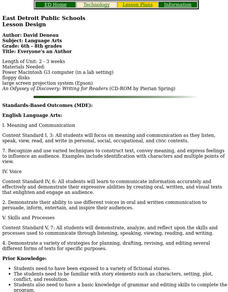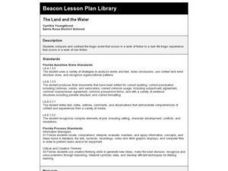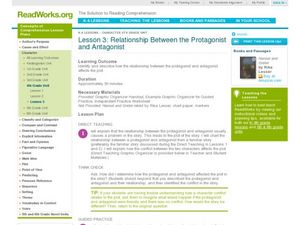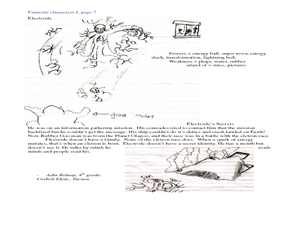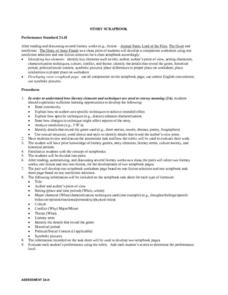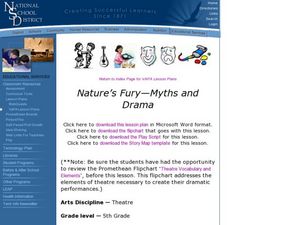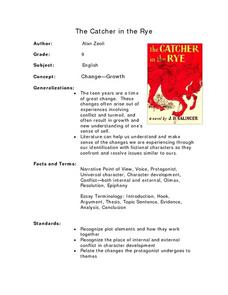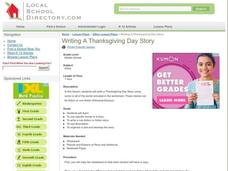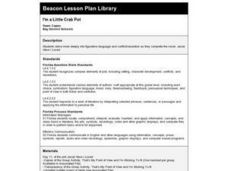Curated OER
Everyone's an Author
Students examine variety of written pieces of quality fiction, discuss what different story elements are present and how those elements make stories as effective as they are, and create a class story.
Curated OER
The Land and the Water
Third graders read "The Land and the Water," a fictional short story and an article about John F. Kennedy, Jr. and compare and contrast fictional tragedy to a non-fiction tragedy. They fill out a Venn diagram and write an essay using...
Curated OER
Science Fiction
Young scholars write a science fiction story. In this science fiction lesson, students read selections of science fiction and compare them to supernatural stories from the Bible. Young scholars identify themes and discuss...
Curated OER
Relationship Between the Protagonist and Antagonist
Young scholars read Hansel and Gretel, and discuss the conflict in the story, while determining who the protagonist and the antagonist are. In this fiction lesson, students chart the conflict in the story they have just read.
Curated OER
fantastic Characters
Students study stories. In this writing lesson, students discuss the three aspects of a story, read stories focusing on the characters, write a story as a class about a character made up by the class, and write a story with an exciting...
Curated OER
Introduction to Myths, Fables, and Legends
Middle schoolers identify elements of myths, fables, and legends as they read an example of each. After reading an example of each type of story, they list elements from each. They compare and contrast these features by...
Curated OER
Story Scrapbook
Students develop a comparison worksheet using one non fiction book and one fiction book they have read to be put into a class scrapbook. In their comparison students must have title, author, point of view, setting, characters, and other...
Curated OER
Nature’s Fury—Myths and Drama
Fifth graders explore the elements of theatre. For this dramatic performances lesson, 5th graders discuss the structural elements of theatre and dramatize "The Origins of the Season," an explanation myth.
Curated OER
Parts of a Story
Learners read a short fiction book and demostrate comprehension by identifying the main characters, setting, conflict, theme, and summarizing the main points. They organize the information in Inspiration and create a powerpoint to show...
Curated OER
Primary Sources and Protagonists: A Native American Literature Unit
Introduce your middle schoolers to the lives of past Native Americans. First, learners work together to put photographs in a sequence. Then, using their sequence, they create stories to share with the whole class. No matter how old your...
Indiana University
World Literature: "One Evening in the Rainy Season" Shi Zhecun
Did you know that modern Chinese literature “grew from the psychoanalytical theory of Sigmund Freud”? Designed for a world literature class, seniors are introduced to “One Evening in the Rainy Season,” Shi Zhecun’s stream of...
Curated OER
The Catcher in the Rye
Ninth graders engage in the reading of literature in order to focus upon some of the basic literary elements while examining "The Catcher In The Rye". They use the experience of reading and literary analysis in order to help develop an...
Curated OER
A Picture Is Worth a Thousand Words
Students, after reading the book, "Esperanza Rising," create a virtual display by combining different story elements into a visual representation. They choose the setting and characters of a scene that will act as a springboard of ideas...
Curated OER
Defending Great Literature
Students defend Mark Twain and the study of The Adventures of Huckleberry Finn using persuasive techniques, appropriate word choice, and correct letter format, in response to a fictional letter by an upset parent.
Curated OER
Enrichment Activities - "Mrs. Frisby and the Rats of NIMH"
Fifth graders read the novel "Mrs. Frisby and the Rats of NIMH." They discuss the various characters in the book, and the different types of conflict that take place within the book. They also research owls and rats to make comparisons...
Curated OER
Writing A Thanksgiving Day Story
Students write a Thanksgiving Day Story using some or all of the words included in the worksheet. These stories can be fiction or non-fiction (Personal Essays). They are graded on sentence structure, paragraph structure, grammar,...
Curated OER
Thornton Wilder's Our Town: The Reader as Writer
Young scholars read a play and create their own play using Thornton Wilder's Our Townas a resource. In this play lesson, students analyze how theatrical elements contribute to a play's meanings and effects. Young scholars recognize...
Curated OER
Evaluate Problem-Solving in the Context of Culture and Time-frame
Students examine literary elements in non-fiction literature. In this problem solving lesson, students read Rosa Parks, My Story and Beyond the Limits. Students make oral presentations based on the causes and effects, conflicts, and...
Curated OER
"The Fog Horn" by Ray Bradbury
Students read Ray Bradbury's "The Fog Horn" and complete reading and vocabulary activities. In this reading and vocabulary lesson, students review the vocabulary for the story and take turns reading the story. Students discuss the story...
Curated OER
I'm a Little Crab Pot
Third graders read Jacob Have I Loved and explore conflict/ resolution.
Curated OER
A Long Time Ago in the Future
Pupils read and discuss Canadian young adult literature. They compare/contrast the elements of citizenship, characterization, and themes, write journal responses, and identify the elements that define Canadians.
Curated OER
Dancing Feathers
Fifth graders read and analyze the novel, 'Dancing Feathers.' They identify the main story elements, develop personal and fictional narratives, retell the story from a different point of view, create a mask, and design a postcard.
Curated OER
Lawton: A Child of the Prairie
Pupils complete word study activities, read a story and write a descriptive paragraph about the setting of Goo Goo Avenue in Lawton 1901.
Curated OER
Mayan Myths/Folktales
Middle schoolers work on summarizing a story, and they determine if it is a legend, a myth, or a fable. Working in groups to read and summarize stories, they then list evidence whether the tale is a myth, fable, or...
